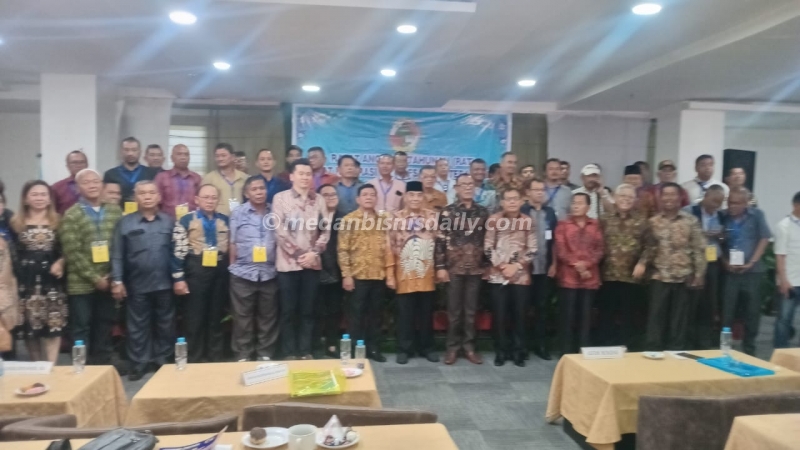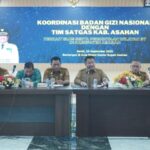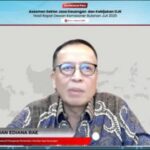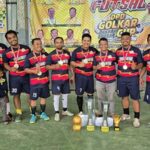Syarikat Bangun has been re-elected as Chairman of the North Sumatra Village Unit Cooperative Center (Puskud) for the 2025-2029 term during the 2024 Annual Members Meeting (RAT) held at the Grand Kanaya Hotel in Medan.
The 2024 RAT was attended by all members of the Village Unit Cooperatives (KUD) from various regencies and cities across North Sumatra.
The election of the new board took place after participants reviewed the accountability report of the previous Puskud Sumut board, also led by Syarikat Bangun.
Alongside Syarikat Bangun, Ir Pandapotan Simanjuntak was elected as First Vice Chairman, Alamsjah Sihombing as Secretary, and Syarifuddin as Treasurer.
Additionally, the 2025-2029 Puskud Sumut Supervisory Board was elected, consisting of Chairman Zainuddin Tanjung, Secretary Lamhot Ginting, and one member.
The 2024 Puskud Sumut RAT began with an opening ceremony featuring speeches from key stakeholders, including the Chairman of the Central Village Unit Cooperative (Inkud), Portasius Nggedi, and the Head of the North Sumatra Cooperative and SME Office, Naslindo Sirait, who officially opened the event.
During the event, Portasius and Naslindo both emphasized the need for Puskud Sumut to drive business innovation amid increasing competition, including the emergence of new players like the Red-White Village Cooperative (Kopdes), recently launched by President Prabowo Subianto.
The newly elected board was officially sworn in by Inkud Chairman Portasius Nggedi.
Grand Kanaya Hotel
The Grand Kanaya Hotel, located in Nikko, Japan, is a historic Western-style hotel established in 1873, making it one of the oldest resort hotels in the country. Built during the Meiji era to accommodate foreign visitors, it blends European architectural elegance with Japanese hospitality. The hotel has hosted numerous dignitaries and remains a cherished landmark, reflecting Nikko’s rich cultural heritage.
North Sumatra Village Unit Cooperative Center (Puskud)
The **North Sumatra Village Unit Cooperative Center (Puskud)** is a cooperative organization in Indonesia that supports rural economic development by providing agricultural services, financial assistance, and community empowerment programs. Established as part of Indonesia’s broader cooperative movement, Puskud aims to improve local farmers’ livelihoods through collective resources and sustainable practices. It plays a key role in strengthening rural economies in North Sumatra by promoting cooperative-based growth and self-sufficiency.
Village Unit Cooperatives (KUD)
Village Unit Cooperatives (KUD) were established in Indonesia during the New Order regime (1966–1998) to promote rural development and agricultural efficiency. These cooperatives aimed to support farmers by providing access to credit, supplies, and markets, while also serving as a tool for government control over rural economies. Though their influence has declined since the late 20th century, some KUDs still operate today, adapting to modern economic challenges.
Central Village Unit Cooperative (Inkud)
The **Central Village Unit Cooperative (Inkud)** is an Indonesian cooperative established in the 1970s to support rural development and economic empowerment. It played a key role in distributing agricultural supplies, providing credit, and promoting collective farming practices under government-backed initiatives. Today, Inkud continues to support local communities through cooperative programs, though its influence has evolved with modernization.
North Sumatra Cooperative and SME Office
The North Sumatra Cooperative and SME Office is a government institution in Indonesia that supports the development of cooperatives and small-to-medium enterprises (SMEs) in the region. Established to promote economic growth and entrepreneurship, it provides training, funding, and regulatory assistance to local businesses. Its efforts align with Indonesia’s broader goals of empowering grassroots economies and fostering sustainable development.
Red-White Village Cooperative (Kopdes)
The Red-White Village Cooperative (Kopdes) is a historic agricultural collective in Estonia, established during the Soviet era to promote communal farming. Named for its symbolic red-and-white buildings, it reflects the socialist modernization efforts of the mid-20th century. Today, it stands as a reminder of Estonia’s collective farming past, with some structures preserved for cultural or educational purposes.






